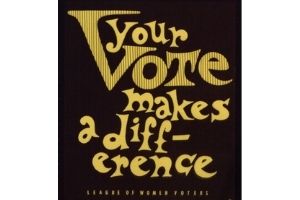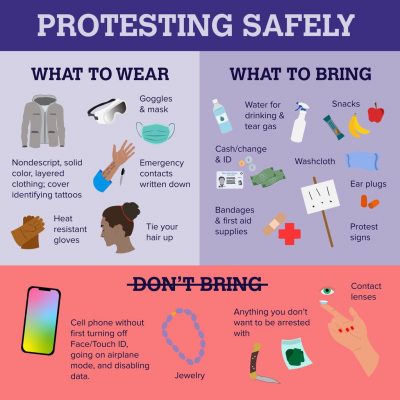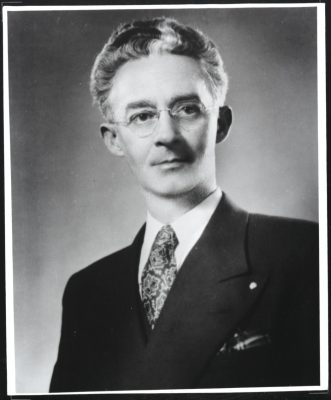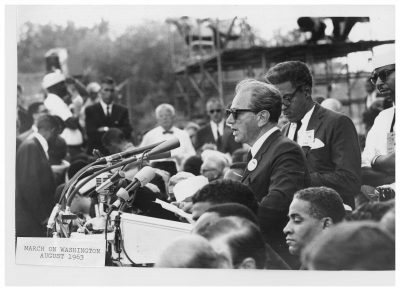Voter Education: Jewish Activism in America

For our regular Voter Education post, I look to Jewish teachings as a framework for how to act in our current times of uprising and injustice. However, more important than my words are how you choose to actually live out these values and to help others. Look at the following resources for educational opportunities, places to donate, and actions you can take today to pursue justice and save lives.
Follow black educators and creators. Seek out literature, learning, and resources about black people. Need a place to start? Read about Black Wall Street and the destruction that occurred on March 31st, 1921. Or read about the Black Panthers and the way that the US used secret police to undermine and ruin the organization.
Join protests. Make sure to verify the origin of the protests you want to attend, as they may not be organized by reliable groups. Also, make sure that you are prepared. Check out the graphic below and do research on local lawyers, bail funds, and other tips to make sure you are armed with the knowledge you need in case you are arrested.
Donate money. If you’re unable to attend protests in person, consider donating to bail funds in your area. If you are in Maryland, you can donate to the Baltimore Action Legal Team (or BALT) fund. If you’re from out of state, check out this simple list to find bail funds in your area. Also, consider donating to other local organizations that are doing important work. Donating locally is often more impactful than donating to national organizations.
Donate supplies. Reach out to the protest organizers and donate supplies, such as face masks, plastic water bottles with squirt tops, snacks, safety equipment, medical supplies, and even signs for protestors to carry. Find out what they need right now.
Pressure your leaders. Even though voting has just happened for Maryland and other areas, local leaders should know that people are listening and watching them all the time. Campaign Zero has lots of resources about legislation and policies that can help you when reaching out to your legislators.
Please share these resources and links and let us know if you take action! Your decision may inspire another person to do the same.

Jewish American history is full of activism. From the labor movement to civil rights, from socialist demonstrations to charity organizations, Jewish Americans have always been a part of political action in the US. These Jewish Americans truly embody the words of the Torah, which state צֶ֥דֶק צֶ֖דֶק תִּרְדֹּ֑ף, or “Justice, justice, you shall pursue” (Deuteronomy 16:2) This statement in the Torah, which begins a portion about the fair judgment of people, Israelite and non-Israelite alike, is a long-held value and the basis for many people’s Jewish identity. For some Jewish people, this value of pursuing justice is the framework of how they think about the world and interact with it, creating these leaders and supporters who have helped to dramatically change the US. And at this moment, as we again face injustice, confusion, and terror, I encourage you to turn back to this statement, and other values in our Jewish teachings.
Every life is precious, as we hold pikuach nefesh, פיקוח נפש as the highest mitzvah in Jewish tradition, that is, the principle that saving a life has more importance over any other mitzvot or action that we could take. Yet, not only should we protect the lives of those around us, but we also need to pursue justice. It’s not enough to perform support when we are in a flashpoint moment like we are right now. We must always be seeking justice, and reform the world around us so that we are not forced to choose between life and our mitzvot. We should not be choosing between a person and rituals or property.
To encourage your own activism, I wanted to share stories of Jewish leaders, some of whom are part of our history of Jewish Baltimore.
Starting around the 1880s, movements calling for fair practices and wages in the garment industry were taking place. These demonstrations, which took place in Chicago, New York, Baltimore, as well as other cities, were in response to the conditions that workers faced in the garment businesses. The garment industry was a huge employer, especially for immigrants who were coming to these cities with little education and English (much like the scrap industry). Baltimore’s businesses specialized in umbrellas, but the industry was so big here, that at one point almost every man in the US could say that they wore a piece of clothing from Baltimore. Despite the accessibility of this work, the conditions were torturous, with workers stuck in sweatshops for 50 to 60 hours a week and paid only minimally. You can read more about the conditions in Baltimore specifically, check out an oral history from Jacob Edelman conducted by Bertha Libauer in 1975.

Speaking of Jacob Edelman, after working and watching the action being led by Sidney Hillman, another prominent Jewish activist, Edelman joined the Amalgamated Clothing Workers of America, which worked to unionize and protect garment workers. His skills as a lawyer were essential for the group in Baltimore, and we even feature Edelman in our Voices of Lombard Street exhibit. Because of people like Jacob Edelman and Sidney Hillman, and others in the Labor Movement, rights such as a 40-hour week, weekends, and minimum wage came about. Their legacy should be remembered and celebrated, as we continue to help workers secure their rights.
Another important moment for Jewish activism was in support of the civil rights movement in the 60s. Acting as allies, by following the guidance of black folks like Dr. Martin Luther King Jr., Jewish communities helped to bring attention to injustice. Famously, Rabbi Joachim Prinz marched with MLK and spoke at the March on Washington. You can hear a recording of his speech or read the transcript here. Rabbi Prinz’s experiences in Berlin as Nazism was on the rise informed his future work and life, and he continued to speak out and work for the rights of all, Jewish and black alike. Other religious leaders also participated in marches, such as Rabbi Abraham Heschel who marched arm-in-arm with MLK in the Selma march.

However, Jewish communities must continue to support black folks today, as well as acknowledge the ways that we haven’t stepped up. As we talk about often on this blog, we cannot be bystanders, as the repercussions of income inequality, redlining, and more affect Baltimore and other cities. Especially when some of these systemic problems have come about with help from Jewish people. We must own our complicity and continue to amplify black voices and causes.
Continue learning about Jewish and black activists, as well as dedicating your time, money, and voice to those that need it most. Join us in following our mission and vision, as we inspire everyone to explore history, take action, and imagine a better future.
